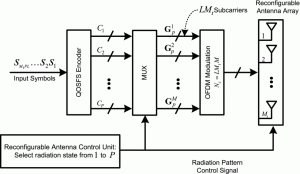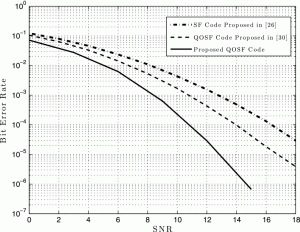EDITORIAL
The FRQNT’s mid-term evaluation process of ReSMiQ ended with a meeting between the center’s management and the evaluation committee at the FRQNT offices in Montreal. We are awaiting the verdict of this committee, but we are confident that the result would be positive.
After an evaluation of all our scholarship and financial aid programs, it was decided to improve them in order to better serve the research members and to increase support for students in their studies and research. We invite you all to consult the web portal to know the new rules of our various programs.
As for the technical activities of our members, we have completed the 7th edition of the ReSMiQ Innovation Day (JIR) which was enriched by numerous technical demonstrations. in addition to lectures given by two ReSMiQ members (Paul-Vahé Cicek from UQAM and Wei-Ping Zhu from Concordia University) and Jeyanandh Paramesh from Carnegie Mellon University in the United States (DL IEEE SSCS). Many thanks and congratulations to all the students who submitted their project and congratulations to the winners of the contest. Furthermore, after an undeniable success in Montreal last June, the 17th NEWCAS conference will be held in Munich between June 23 and 26, 2019. We congratulate the team that completed NEWCAS’18 with great success. It is for this purpose that we strongly encourage ReSMiQ members to submit their publications in large numbers and thus continue the tradition of quality of this conference initiated in 2003.
ReSMiQ’s management team wishes you a happy holiday season and a Happy New Year 2019.
NEWS FROM OUR MEMBERS
Achievements
– Dr. Gosselin from Université Laval receive jointly with his colleagues the prestigious NSERC Brockhouse Canada 2018 award for their research work on designing tools to improve knowledge of the brain.
More details : Le Soleil / CRSNG / U. Laval : Le Fil, Fac. de génie, Fac. de médecine
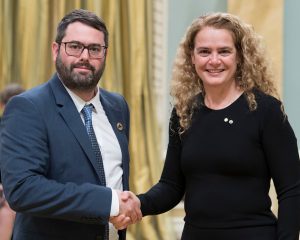
Benoit Gosselin, U. Laval; Julie Payette, Governor General of Canada.
– Dr. Gosselin and his colleagues from Université Laval received a Research Tools and Instruments Grants from NSERC to develop innovative tools to support brain research.
– Dr. Langlois and Dr. David from Polytechnique Montréal are supervising Ahmed Abdelsalam at the Ph.D. whose recent article entitled “POLYBiNN: A Scalable and Efficient Combinatorial Inference Engine for Neural Networks on FPGA” received the Best paper Award at the Conference on Design and Architectures for Signal and Image Processing (DASIP 2018), held in Porto, Portugal, from October 10th to 12th.
Plus de détails
– Dr. Beltrame from Polytechnique Montréal is the recipient of the Nanjing City Prize for Innovation in Science and Engineering at the IEEE RO-MAN conference held in Nanjing, China.
Exposure
– Dr. Beltrame from Polytechnique Montréal organized PANGÆA-X 2018, a field experiment in Lanzarote in the Canary Islands jointly with the European Space Agency (ESA). Astronaut Matthias Maurer used robotic control systems and the team tested multi-robot planetary exploration with 6 drones.
Photo gallery
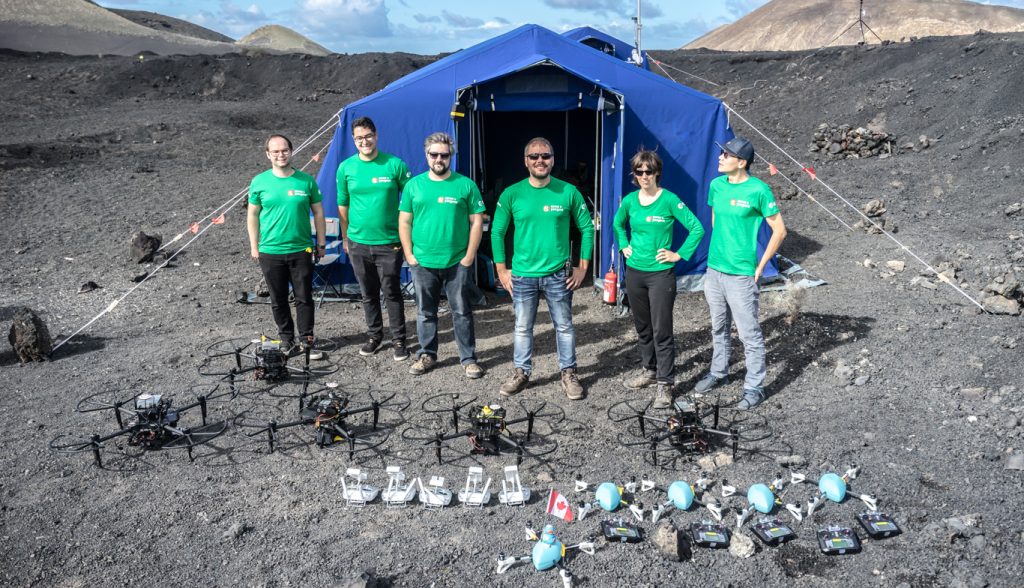
RESMIQ’S ACTIVITIES
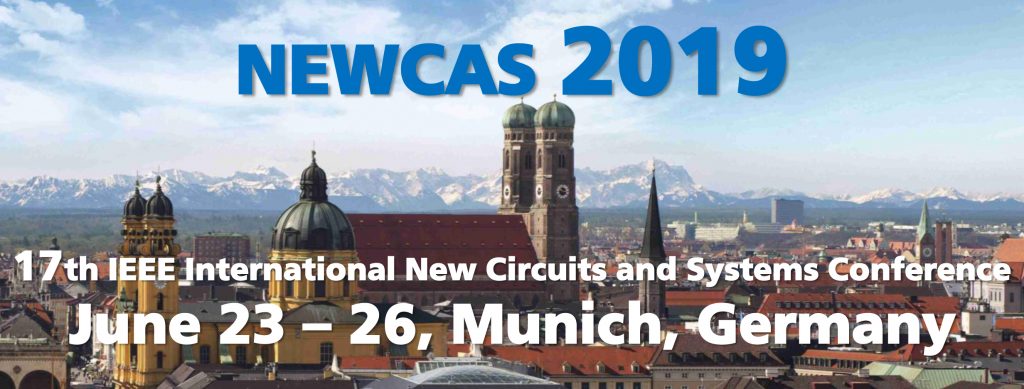
Scholarships and financial support
Scholarships and financial support for graduate students
– Financial support
– Supplementary scholarship
– ReSMiQ scholarship for M.Sc. and Ph.D.
– ReSMiQ Ph.D. Completion scholarship
APPLICATION DEADLINE: January 7, 2019
More details
ReSMiQ Scholarship for Postdoctoral Fellows
APPLICATION DEADLINE: January 7, 2019
More details
Financial support for conference participants
APPLICATION DEADLINE: January 7, 2019
More details
ReSMiQ-FRQNT Scholarship for International Internship
APPLICATION DEADLINE: January 14, 2019
More details: Contact ReSMiQ’s coordinnator
Financial support for invited researcher
APPLICATION DEADLINE: February 4, 2019
More details
Financial support for undergraduate students
APPLICATION DEADLINE: March 25, 2019
More details
NEWS FRON THE NET
IBM warns of instant breaking of encryption by quantum computers: ‘Move your data today’. Welcome to the future transparency of today as quantum computers reveal all currently encrypted secrets — a viable scenario within just a few years. more details
Nuclear Imaging Enters a New Era: combining diagnosis and therapy, nuclear medicine has the potential to advance cancer treatment and care. more details
Physiological Sensing Now Open to the World: New resources are allowing us to learn, experiment, and create imaginative solutions for biomedical applications. more details
World’s smallest optical implantable biodevice: Japanese researchers describe a new implantable device no bigger than the width of a coin that can be used to control brain patterns. more details
SIGNAL is the main monthly information medium of the Microsystems Strategic Alliance of Québec (ReSMiQ). This newsletter aims to be an active link between the members of ReSMiQ and all individuals who have an interest in research and innovation in microsystems. We commit ourselves to promote in it our members’ research and increase ReSMiQ’s visibility.
ReSMiQ is a group of researchers in an interuniversity research center that can count on the support of the Fonds de recherche du Québec – Nature et technologies (FRQNT) and nine (9) Quebec universities involved in microsystems research.




